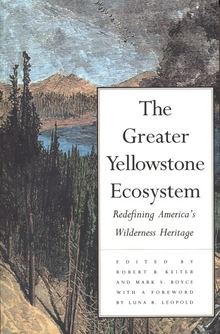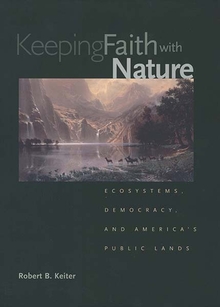The Greater Yellowstone Ecosystem
WARNING
You are viewing an older version of the Yalebooks website. Please visit out new website with more updated information and a better user experience: https://www.yalebooks.com
Redefining America`s Wilderness Heritage
Robert B. Keiter; Edited by Mark S. Boyce; With a Foreword by Luna B. Leopold
In 1872 Congress designated Yellowstone National Park as the world’s first national park; nineteen years later, the land adjacent to Yellowstone became America’s first national forest reserve. Since that time, the entire Yellowstone region has been the scene of major battles over resource management—debates between those who would use the land for extraction of national resources (mining, lumbering, and hunting, for example) and those who believe that wildlife and recreation should dominate land use.
In this book, experts in science, economics, and law discuss key resource management issues in the greater Yellowstone ecosystem, using them as a starting point to debate the manner in which humans should interact with the environment of this area. Some authors reflect upon the summer 1988 fires at Yellowstone and review the role and effect of fire in the ecosystem. Others offer opinions on appropriate management of elk and bison, key attractions to Yellowstone since its inception. Still others address the question of whether wolves—now a missing component of the Yellowstone ecosystem—should be restored to the region. A final essay by editors Robert B. Keiter and Mark S. Boyce suggests how ecosystem management principles will affect Greater Yellowstone’s future and how an ecological process management philosophy might be implemented.
This important book, which includes special archival photographs of the Yellowstone area, will be the major source of information on this land for years to come. It is also valuable for all who are interested in how wildlands throughout the world can be preserved in their natural state in the face of accelerating human encroachment.
"A much-needed survey of the many problems associated with process-based eco-system management."—Luna B. Leopold, from the foreword
"The variety of opinions and scientific interpretations presented in this milestone volume reveal the extraordinary challenge facing Greater Yellowstone, where every important issue is a matter of intense and often heated debate. Students of Greater Yellowstone issues, and proponents of various management approaches, will find much to think about here."—Robert D. Barbee, Superintendent, Yellowstone National Park
"Excellent. . . . Highly instructive for all of us are the legal and political complexities of Yellowstone."—Colin Tudge, New Scientist
"Well-illustrated. . . . Its main sections include groups of chapters on the challenge of managing the greater Yellowstone ecosystem, fire policy and management, conservation biology and wildlife, ecology, and wolf recovery."—Ronald M. Lanner, Science Books & Films
"Explores a reasonably healthy variety of views on a complex subject. . . . [A] reasoned statement of the management dilemma."—Peter F. Brussard, Science
"A timely and significant contribution to the important dialogue currently surrounding natural resource management policies. . . . The fundamental interaction of public values and the movement toward ecosystem-based management presented should be of major interest to all who visit and enjoy U. S. national forests and parks. . . . Strongly recommended for public library patrons and should be required reading for all college students in any of the natural resource disciplines."—Choice
"A fascinating study of conservationist conundrums in action. Anybody interested in social as well as ecological problems of wilderness management will find this book a necessity, as well as a good read."—Anna Bramwell, Environmental Politics
"An excellent textbook for a course in wildlands management, public lands policy, or environmental ethics, as well as rich reading for anyone interested in the ongoing debate about how to manage or not manage the Greater Yellowstone Ecosystem, and by inference, the world. I highly recommend the book."—George Wuerthner, Wild Earth
"Thought-provoking reading for all concerned about wilderness or the future of publicly-owned natural resources. . . . Whether or not you agree with the premise that ecosystem management is desirable or with the assessment of its current state of implementation, The Greater Yellowstone Ecosystem is a valuable tool in the debate."—Marla E. Mansfield, Land and Water Law Review
"The book will appeal to readers who are interested in public policy as it relates to management of public lands. Anyone with a specific interest in the Yellowstone region should also find the book fascinating reading."—Thomas R. Wentworth, American Scientist
Publication Date: October 23, 1994



